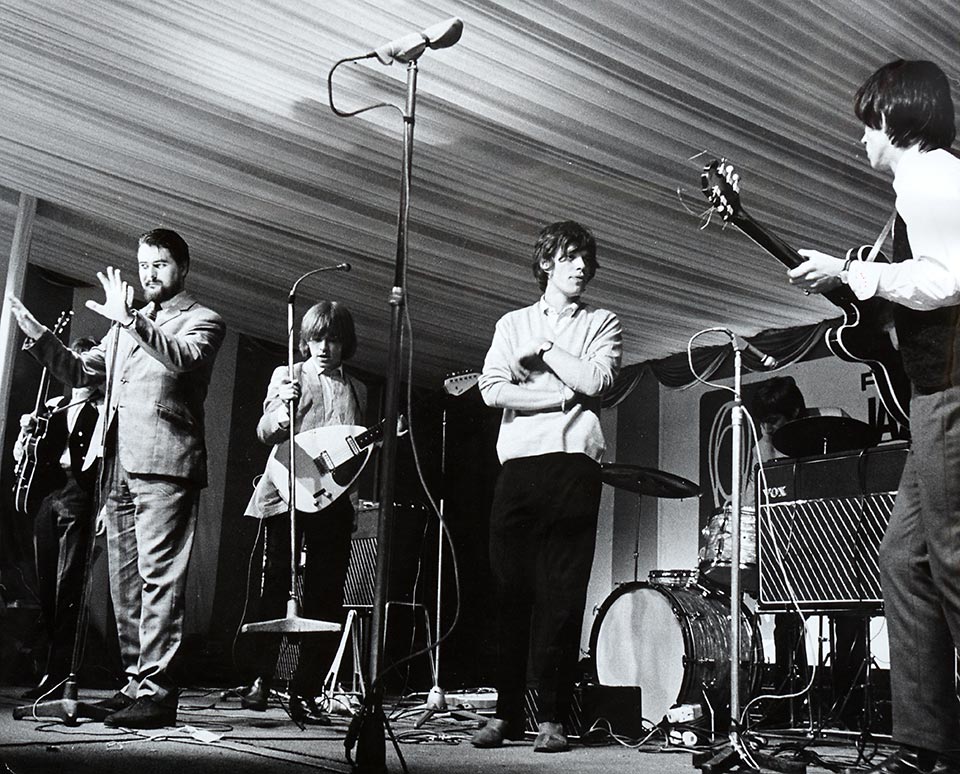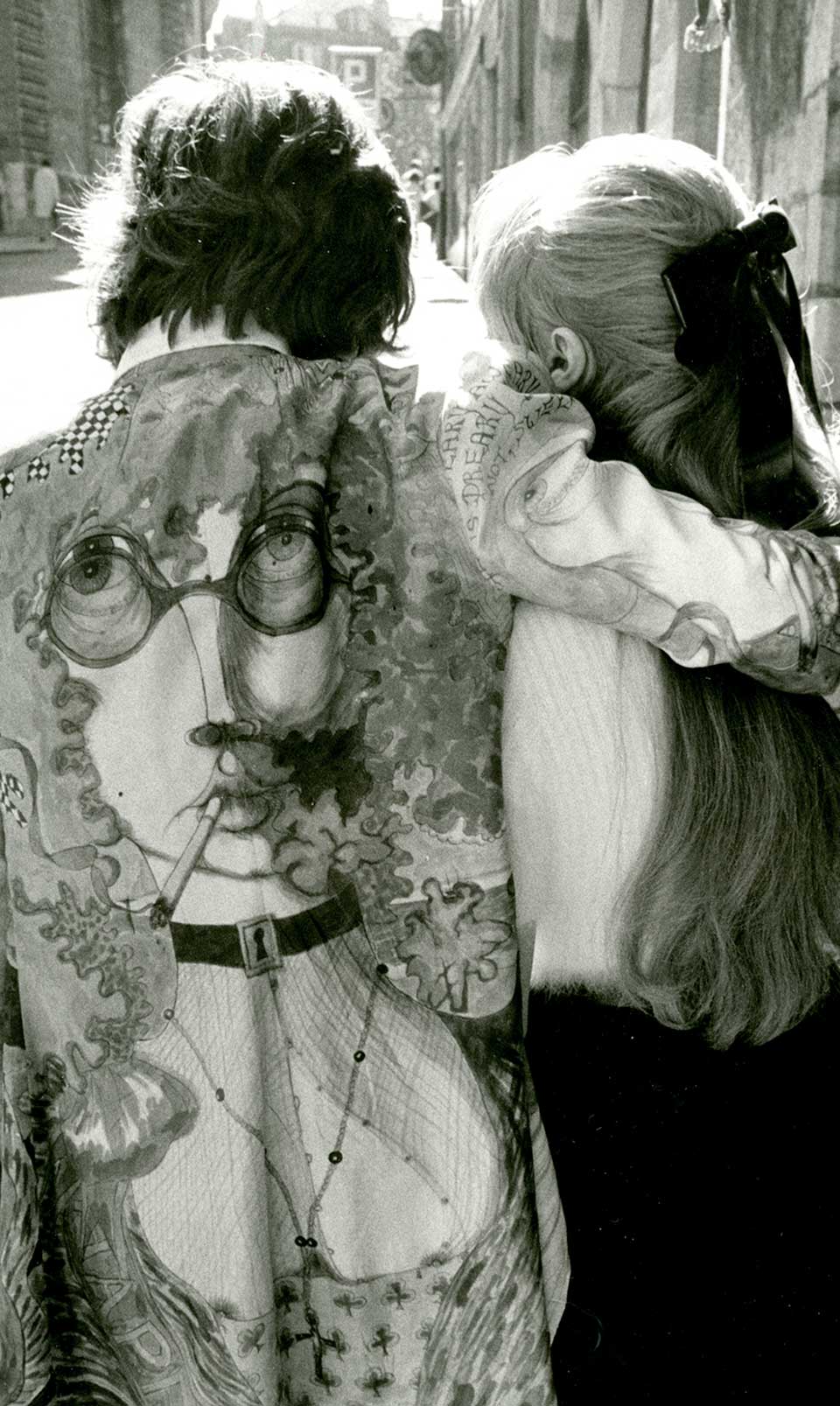THE ROLLING STONES & GIORGIO GOMELSKY
Auch über ihren ersten Manager Giorgio Gomelsky (vorne links) der in Locarno aufgewachsen ist, haben die Rolling Stones eine Schweizer Connection. Gomelsky, der keinen schriftlichen Vertrag mit der Band hat, wird im Mai 1963 von Andrew Loog Oldham abgelöst - während er zum Begräbnis seines Vaters in der Schweiz gereist ist. Darauf widmet sich Gomelsky stattdessen den Yardbirds, die er auch in seine einstige Heimat bringt. Photo vom 4. National Jazz Festival in Richmond, August 1964.
The Rolling Stones also have a Swiss connection through their first manager Giorgio Gomelsky (front left), who grew up in Locarno. Gomelsky, who had no written contract with the band, was replaced by Andrew Loog Oldham in May 1963 - while he was travelling to his father's funeral in Switzerland. Gomelsky devoted himself to the Yardbirds instead and brought them also to his former homeland. Photo from the 4th National Jazz Festival in Richmond, August 1964.
SIE KOMMEN NICHT!
Zeitungsauschnitt aus dem Blick, August 1965. Die Schweizer Konzertagentur Földi, die im Sommer 1965 bereits ein Konzert mit Cliff Richard and The Shadows im Zürcher Hallenstadion organisiert hat, will die Rolling Stones in die Schweiz bringen. Als Datum steht der 10. September 1965, gleich anschliessend startet eine ausführliche „Bravo“ Tournee der Stones durch Deutschland. Doch das Konzert scheitert am Widerstand der Behörden (und wohl an der dilettantischen Arbeit der Organisatoren). Stattdessen holen die Organisatoren kurz später The Kinks ins Festzelt (oder ist es eine „Plastikhalle“ wie der Blick schreibt?) auf der Allmend Brunau, wo die Stones hätten spielen sollen.
A Swiss concert agency, which had already organised a concert with Cliff Richard and The Shadows in Zurich's Hallenstadion in August 1965, wanted to bring the Rolling Stones to Switzerland. The date was fixed to 10 September 1965, immediately followed by an extensive "Bravo" tour of Germany by the Stones. But the concert failed due to the resistance of the authorities (and probably due to the amateurish work of the organisers). Instead, they brought The Kinks to the Allmend Brunau in Zurich, where the Stones should have played.
MICK & MARIANNE IN GENEVA 1967
John Kelly
Mick Jagger begleitet seine Freundin Marianne Faithfull 1967 nach Genf, wo sie mit Alain Delon den Film „La motocyclette“ dreht. Bild aus der Genfer Altstadt, beim Palais de la Justice.
Mick Jagger accompanies his girlfriend Marianne Faithfull to Geneva in 1967, where she is co-starring Alain Delon in the movie "La motocyclette". Picture from Geneva's old town, by the Palais de la Justice.
MICK & MARIANNE IN GENEVA 1967
John Kelly
Modisch und verliebt: Mick Jagger & Marianne Faithfull in der Genfer Altstadt, 1967.
Fashionable and in love: Mick Jagger & Marianne Faithfull in Geneva's old town, 1967.
KEITH RICHARDS IN BERN, 1974
Um den 20. Oktober 1974 herum weilt Keith Richards in Bern - angeblich, um sich wieder einmal die Zähne richten zu lassen. Er macht aber auch einen Abstecher ins Berner Sinus Studio in der Altstadt, wo er Overdubs für den Song „Scarlet“ einspielt, den die Stones zusammen mit Jimmy Page von Led Zeppelin in einer spontanen Session aufgenommen haben. Der Song bleibt unter Verschluss, bis er 2020 als Bonus Track der Wiedeveröffentlichung des Albums „Goat Head Soup“ erscheint.
Around 20 October 1974, Keith Richards is in Bern - supposedly to have his teeth fixed once again. But he also makes a detour to Bern's Sinus Studio in Bern’s old town, where he records overdubs for the song "Scarlet", which the Stones recorded together with Jimmy Page from Led Zeppelin in a spontaneous session. The song remains unreleased until it appears as a bonus track on the re-release of the album "Goat Head Soup" in 2020.
KEITH RICHARDS UND PETER MAC TAGGART
Keith Richards und Peter MacTaggart bei Overdubs zu „Scarlet“, Sinus Studio Bern, Oktober 1974.
Keith Richards and Peter MacTaggart checking Ovedubs for "Scarlet", Sinus Studio Bern, October 1974.
YESTERDAY’S PAPERS
Lange gelten die Rolling Stones als die bösen, nicht gesellschaftsfähigen Buben des Rock’n’Roill. Doch die Zeit ist auf ihrer Seite. Jahrzehnte nach ihrer Gründung werden sie zu den Lieblingen der Tabloide und seriösen Zeitungen, die ihnen gerne Sonderdrucke widmen. Hier zwei Beispiele von Blick (2003) und Neue Zürcher Zeitung (2012).
For a long time, the Rolling Stones have been considered the bad, unsociable boys of Rock'n'Roll. But time is on their side. Decades after their formation, they have become the darlings of tabloids and serious newspapers, which gladly dedicate special issues to salute them. Here are two Swiss examples from Blick (2003) and Neue Zürcher Zeitung (2012).
FELIX AEPPLI’S ULTIMATE STONES GUIDE
Felix Aeppli, ein Zürcher Historiker und Experte für Schweizer Film ist auch ein bedingungsloser Stones Fan und - Sammler. Seine monumentale Diskografie „The Ultimate Guide“ und seine Datenbank über Stones-Sessions uns Livedaten gilt weltweit als Referenzwerk und wurde auch von den Stones selber mit Wohlwollen zur Kenntnis genommen.
Felix Aeppli, a Zurich historian and expert on Swiss film, is also an unconditional Stones fan and collector. His monumental discography "The Ultimate Guide" and his database of Stones sessions and live dates is regarded worldwide as a reference work and was also noted with favour by the Stones themselves.







